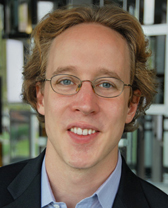J. Alex Halderman to Teach Course on Electronic and Internet Voting through Coursera

 Enlarge
Enlarge
The University of Michigan is venturing into the realm of free online courses through the education company Coursera, which was founded in 2011 by two faculty from Stanford University. Among the courses to be offered this fall is Securing Digital Democracy, taught by U-M Prof. J. Alex Halderman.
Over 4000 people have already registered for the course, which is free and open to the public. Prof. Halderman is enthusiastic about the project and has stated, “This is an exciting opportunity to experiment with new teaching technologies, and it’s an important opportunity to pursue our fundamental missions of education and public outreach in a 21st century medium.”
The 5-week course, which is categorized by Coursera under both Computer Science and under Society, Networks, and Information, will provide the technical background and public policy foundation that today’s citizens need to understand the electronic voting debate. This excerpt from the course introduction provides a general overview of the topic:
Computer technology has transformed how we participate in democracy. The way we cast our votes, the way our votes are counted, and the way we choose who will lead are increasingly controlled by invisible computer software. Most U.S. states have adopted electronic voting, and countries around the world are starting to collect votes over the Internet. However, computerized voting raises startling security risks that are only beginning to be understood outside the research lab, from voting machine viruses that can silently change votes to the possibility that hackers in foreign countries could steal an election.
The course will cover how electronic voting and Internet voting technologies work, why they’re being used, and what problems they aim to solve. It will also cover the computer- and Internet-security risks these systems face and the serious vulnerabilities that recent research has demonstrated. Finally, it will outline how computer technology has the potential to improve election security, if applied intelligently.Professor Halderman’s research spans applied computer security and tech-centric public policy. His interests include software security, data privacy, electronic voting, anticensorship, digital rights management, and cybercrime, as well as technological aspects of intellectual property law and government regulation. He teaches Introduction to Computer Security (EECS 398) and Computer and Network Security (EECS 588).

 Enlarge
Enlarge
Prof. Halderman’s recent research projects have included exposing security weaknesses in Washington DC’s Internet-based absentee voting system and in India’s electronic voting machines, and in creating technology to circumvent state-level Internet censorship.
Additional Information
The University Record: U-M among first to offer courses through groundbreaking online approach
New York Times: Online Education Venture Lures Cash Infusion and Deals With 5 Top Universities
National Public Radio: From Silicon Valley, A New Approach To Education
 MENU
MENU 
